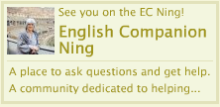This summer, I plan to spend time organizing question stems to spark critical thinking and post them on a number of slides to share with teachers.
OR
I could shorten the process and use just one slide. I could ask one question that is guaranteed to drive critical thinking. I could ask:
“So what?”
To be honest, the first time I was asked this question in an academic setting, I was appalled. I felt I was being taunted. I was sure the professor was just being rude.
I was uncomfortable…I could not give an effective response.
“So what?”
I hated the question. I hated that the professor was goading me. I hated Dr. Steven D. Neuwirth.
I was taking a graduate course (560) Literature of the American South, what I thought would be a “fun” course as I completed my Master’s Degree in English.
I remember distinctly the moment that was not fun…the evening of the second class.
“So what?” Dr. Neuwirth wrote on the chalkboard; he snapped a piece of chalk as he underlined the question for emphasis.
“So what?“ he repeated in class after I offered what I thought was a brilliant observation on the evidence of dignity as a character trait in a discussion on William Falkner’s As I Lay Dying.
I was irritated. I had worked very hard on my responses.
“So what?“ he scrawled in big letters on the paper I handed in three weeks later.
I was angry. I had worked even harder on that response.
My frustrations continued. Nothing in my training had prepared me for his persistence with the “So what?“ question.
I had done what had worked in every other class. I had developed a thesis. I had used evidence. I had proved my thesis.
Regardless, my answers did not satisfy his challenge. So what? He found my reasoning lacking, and because he was not satisfied, neither was I.
I needed to think how to explain better.
I had to think differently.
I had to think critically.
It was then I realized that Dr. Neuwirth’s “So what?” question was making me think critically.
Dr. Neuwirth’s irritating challenge brought me to recognize that it was not enough for me to develop and prove a thesis in a paper. I had to prove why my argument mattered.
For example, it was not enough to prove that Faulkner’s characters displayed dignity despite their social status, I had to question so what is the reader to take from his writing?
I had to ask the question “So what?” not with attitude but with curiosity. Curiosity led to inquiry:
- So what was my point?
- So what was missing from my response?
- So what should I want the reader to know or do?
- So what happens next?
- So what do I do to cause or prevent something from happening ?
- So what makes this work or not work?
- So what will this information lead me to study next?
Such inquiries led to me to make conclusions. I had always found conclusions difficult to write. I had always followed the predictable formula of restating the thesis, but I found that when I used the critical question “So what?“ I could offer a broader conclusion.
For example, when I developed a thesis on the dignity of Faulkner’s characters and provided evidence from the text, I was really posing the question “Why should anyone read novels by Faulkner?” When I asked myself so what? I could conclude that Faulkner’s characters spark empathy in the reader.
It turned out that I did not hate the“So what?“ question.
I did not hate Dr. Neuwirth …although, admittedly, liking him took a little longer. While I did understand the importance of being challenged, I still found him a brilliant but abrasive teacher.
Four years after that class, I became a teacher, and I taught literature. My students wrote predictable and boring conclusions that restated the thesis. They were not thinking critically. I had to do something.

Dr. Steven Neuwirth, Western Connecticut State University-created the University’s Honors Program and served as its first director; he passed away February, 2004.
I asked my students “So what?“
And I scrawled “So what?“ on their papers.
And I wrote “So what?“ on the Smartboard -without chalk.
My students also hated the“So what?“ question.
They complained to me, but their conclusions improved.
So here is one question, one irritating question, for critical thinking for sharing on one slide:
“So what?“






I love this post because when I started teaching more than 30 years ago, the most frequent comment I wrote on students’ papers was “You haven’t answered the ‘So what’? question. Now I work with PhD candidates who think that everything they write is brilliant, and they are irritated and defensive when I write the same comment on the drafts of their dissertations. Like you, they don’t understand what it means initially, but when, like you, I ask additional questions that force them to see what’s missing and what’s there that needn’t be, they see that I’m trying to get them to dig deeper, to think more critically, and to explain better. Thanks for a great post.
Thank you. If your voice rings in their ears the way Neuwirth’s rings in mine, they will be better writers…and they will forgive you later.